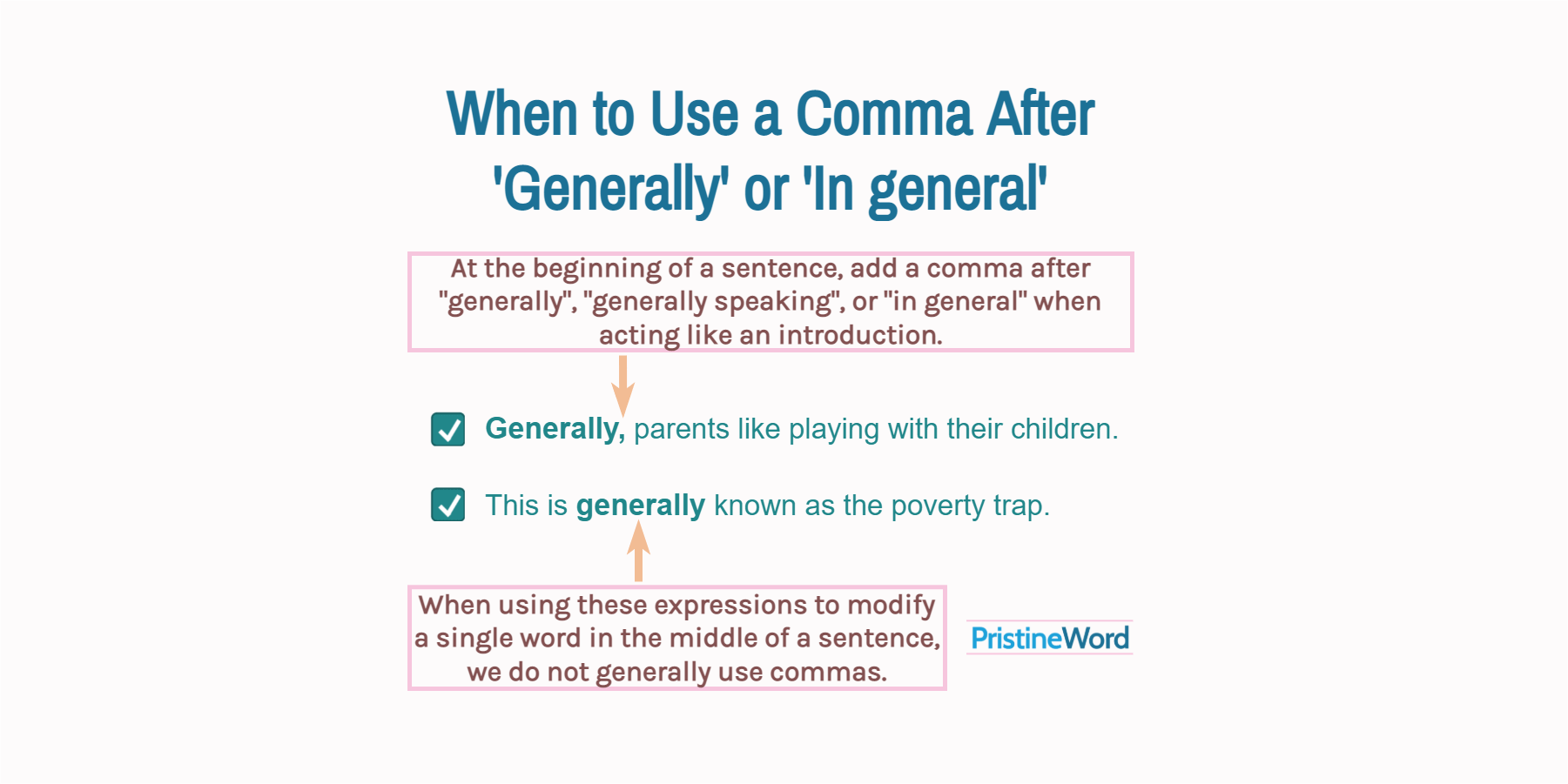When acting like an introduction at the beginning of a sentence, add a comma after the expressions "generally", "generally speaking", or "in general".
As an introduction at the beginning of a sentence, add a comma after the expressions "generally", "generally speaking", or "in general".
Generally, parents like playing with their children.
In general, add a comma after an introductory phrase.
When using these expressions to modify a single word in the middle of a sentence, we do not generally use commas.
This is generally known as the poverty trap.
But use commas in mid-position if the adverb modifies a whole sentence or clause—instead of a single word.
Dogs, generally speaking, can be trained by using games and positive reinforcement.
Contents
1. 'Generally' at the Beginning of a Sentence
The adverb "generally" means "usually" or "for the most part".
Generally, those who get organized and stay focused succeed in business.
As a general rule, follow "generally" with a comma to introduce a sentence or clause.
Generally, people who fall in love have a tendency to reorder their daily priorities and change their clothing,
As a synonym of "generally", you can use the adverbial phrases "generally speaking" or "in general". Follow the same comma rules with these introductory phrases.
In general, tall people are more likely to experience back pain.
Generally speaking, there’s no right or wrong answer when deciding if you want to become fluent in Chinese or Japanese.
While "generally" is frequently followed by a comma at the start of a sentence, there are exceptions.
Generally accepted accounting principles refer to a common set of accounting principles issued by the Financial Accounting Standards Board.
2. Commas Around 'Generally' in Mid-sentence
"Generally" can be a:
- sentence adverb (modifying a whole sentence), or
- regular adverb (modifying a single word—verb, adjective, or adverb).
Sentence adverbs should be set off by commas to signal that they do not modify a single word but a complete sentence or clause.
A healthy diet should include, generally, fruits, vegetables, and nuts.
Doctors are driven, generally speaking, by a desire to help their patients.
We do not usually add commas when using regular adverbs of frequency, such as "generally", to describe a verb, adjective, or adverb in mid-sentence.
It is generally true that sugary drinks provide too many calories and virtually no other nutrients.
It is, generally, true that sugary drinks provide too many calories and virtually no other nutrients.
In the example above, "generally" modifies a single word ("true"), so no comma.
As a regular adverb, the word "generally" often comes before the main verb.
These policies are generally accepted.
In some sentences it can come after the verb.
Our team plays generally well.
The word "generally" is rarely found at the end of a sentence. In the end position, it makes the idea sound more uncertain or hesitant.
I like to play with my friend John, generally.
Although the expression "in general" almost always comes at the start of a sentence, it can also fall in mid-sentence, between commas, after the verb.
Collaboration between the private and public sectors is, in general, difficult.
3. Commas After 'Hypothetically', 'Paradoxically', 'Structurally', etc.
Follow the same strategy when deciding whether to use commas before or after the sentence adverbs "hypothetically", "paradoxically", "holistically", "structurally", "stylistically", etc. That is:
At the start of a sentence, add a comma after these words.
Hypothetically, I could invest in gold and make a fortune.
Enclose them in commas to modify (describe) a complete clause in mid-sentence.
This is how we want to portray, stylistically, our world.
Some of these adverbs could be easily followed by the word "speaking"; thus, we say "hypothetically speaking", "holistically speaking", "structurally speaking", "stylistically speaking", etc.
She can do it, hypothetically speaking, without your permission.
But we do not generally use commas when describing a single word (verb, adjective, or adverb) in the middle of a sentence.
There is nothing structurally wrong with her eye.
This challenge requires lasting solutions that must be holistically addressed.
Recommended: Commas after technically, scientifically, financially, medically, etc.

